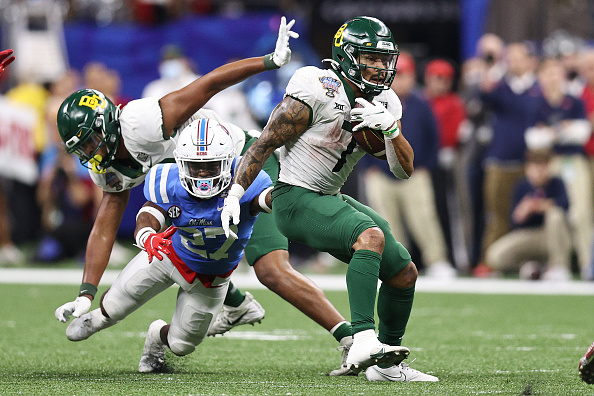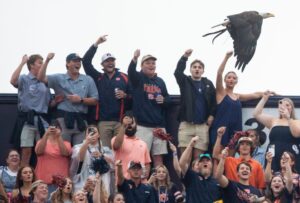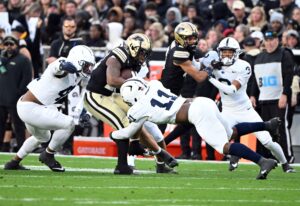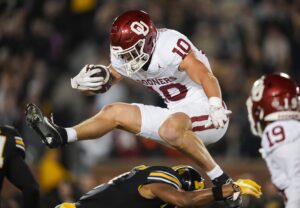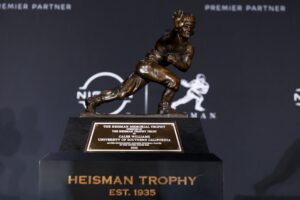Baylor Wins the Sugar Bowl
Like most fans, we expected plenty of fireworks from the two high-powered offenses heading into the Sugar Bowl matchup. That is not exactly what we got. Largely though solid defensive effort, Baylor wins the Sugar Bowl by a final score of 21-7. Here is how they got there.
Defensive First Half
Our expectation for fireworks in a high-scoring affair could not have been more wrong through the first half. The teams combined for just 260 yards of offense over the first two quarters. Both teams sustained a handful of solid drives. Ole Miss’ drives ended with a missed field goal and an interception, and Baylor’s long drive (of 53 yards) ended with a punt. Indeed, eight of the 13 combined drives in the first half ended in four or fewer plays.
This is far from the expectation. That said, Baylor’s defense has been particularly effective under Head Coach Dave Aranda. We assumed that both teams would make some big plays defensively. However, we also expected more playmaking on the offense. In fact, the only points scored by either team in the first half came from a 96-yard pick-six by Al Walcott.
Ole Miss’ offense suffered an early hindrance with the first-quarter injury suffered by Matt Corral, which no doubt capped the potential for fireworks on that side of the equation. Baylor’s defense dialed up the pressure and took advantage of the inexperience of Luke Altmyer. He showed some flashes of confidence before the interception. This presented us with typical youthful inconsistency that would foreshadow his second-half performance.
Altmyer Emerges
After halftime, the teams traded punts again for three straight drives. On the fourth drive of the half, however, Ole Miss showed signs of life. After a pass interference on the first play–a long ball from Altmyer to Braylon Sanders–the Rebels ripped off four straight runs. Those runs set up another deep pass from Altmyer to Sanders resulting in a 37-yard touchdown to knot the game at seven.
Baylor looked to answer on the next drive and moved the ball effectively. Gerry Bohanon tried to cap the drive with his own 30-yard deep ball to the Bears’ deep-threat weapon, Tyquan Thornton. Miles Battle turned around right as the ball arrived and picked the pass out of the air to cause Baylor’s first turnover. That ended the drive.
Altmyer then led a 13 play, 70-yard drive that stalled just inside the red zone. Altmyer made several critical heads-up plays uncharacteristic of his inexperience. Unfortunately for Ole Miss, Cale Nation missed his second field goal of the night, this time a 35-yard attempt.
Baylor Responds
Baylor responded to the missed field goal with a characteristically-efficient drive. In just five plays, the Bears covered 80 yards on just four carries and an incomplete pass. Monaray Baldwin scampered for 48 yards to give Baylor a 14-7 lead with 13 minutes left in the game.
Then, Baylor dialed the pressure up several notches, forcing a sack on the first play of Ole Miss’ next drive, then forcing Altmyer out of the pocket on a scramble. On the third play, the pressure forces Altmyer into an errant pass into a crowd that JT Woods picked off. Five plays later, Bohanon hit Thornton for a two-yard touchdown reception to take a 21-7 lead.
Baylor never looked back after that, turning Ole Miss over on downs the next drive and running out the clock to close out the game. Like that, Baylor wins the Sugar Bowl.
The “Opt Out” Talking Point
Every year, we see a dozen or so high-profile NFL prospects opting out of bowl games citing injury risk. Some fans understand the decision. Most, however, lambaste players for the “selfishness.” As noted above, Corral suffered a lower leg injury in the first quarter. He returned to the field in street clothes and on crutches.
Corral offered a very selfless explanation for his decision to play. He refused to betray the relationship he forged with his teammates. Corral did not need a good performance in the game to cement his draft status. He is almost universally viewed as a first-round draft pick, but he played anyway. Proponents of the decision for players to opt out will certainly use Corral’s injury as a feather in the cap of their arguments.
Given the rationale behind his decision, we doubt very seriously Corral regrets his decision. He appeared more frustrated he could not be out there to help his team win. That speaks well to his character. Regardless, we hope the injury heals quickly and wish him the best.


